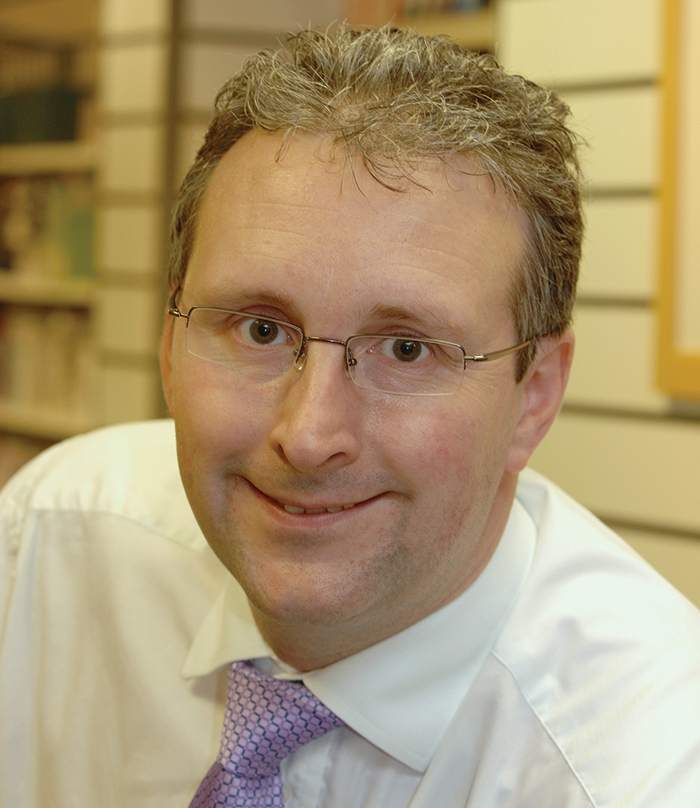'You can do amazing things with data'
In Interviews
Follow this topic
Bookmark
Record learning outcomes
 Isle of Wight pharmacist Gary Warner 'could do with a bit more sleep', he says, after several years of developing a pioneering platform for pharmacy service commissioning. P3's Carolyn Scott finds out more about the project
Isle of Wight pharmacist Gary Warner 'could do with a bit more sleep', he says, after several years of developing a pioneering platform for pharmacy service commissioning. P3's Carolyn Scott finds out more about the project
Pharmacists in leadership roles get involved all sorts of things to help move the profession forward, but complex computer coding is not necessarily the first thing that springs to mind. But for the past few years, aside from his role as a community pharmacy owner, this has been the focus for Isle of Wight pharmacist Gary Warner and his three colleagues. Known for his roles nationally on the PSNC and locally as a PEC pharmacist at NHS Isle of Wight and as an LPC member, he has also been working behind the scenes to develop the use of software that has quietly been stacking up success in bringing community pharmacies together with local commissioners to deliver pharmacy services.

A visual representation of the services data captured by PharmOutcomes
The system's name may be familiar; you may even use it, but the story behind PharmOutcomes as a pharmacist-run initiative is rarely heard in detail. The reason for that is that those involved are simply too busy delivering to tell it.
Even more remarkable is that the team's motivation for giving up innumerable hours of family time and evenings and weekends for the project is not for financial gain. This initiative is a non-profit-making social enterprise, meaning that any surplus or profit made is put back into the scheme.
How it works
The social enterprise organisation Pinnacle Health Partnership employs two pharmacists, Mr Warner and Kevin Noble, project manager Pamela Bowes and more recently Jason Harris, a software developer, together with its helpdesk team. Pinnacle gets involved in a range of projects with the health service and local authorities that champions the development of the roles of community pharmacists. Mr Warner and Mr Noble provided the seed funding for the launch, in April 2013, of PharmOutcomes, a national IT platform 'to support the efficient recording, reporting and invoicing of a range of community pharmacy services which enable local and national-level analysis and reporting on the effectiveness of commissioned services'. PSNC welcomed the launch of the project when it replaced the previous PharmaBase platform, as 'for pharmacy, by pharmacy'.
Both commissioners and community pharmacists use the web-based PharmOutcomes system to set up criteria for pharmacy-led services and to record when interventions have been carried out by individual pharmacies.
Ingeniously, it's been set up to link with local council accounting systems and to meet strict levels of confidentiality and data security. Commissioners receive real-time reports of the work that's been carried out, allowing them to approve payment to pharmacies without the need for individual invoices €“ saving everyone a huge amount of administrative time, and prompting payment 'in as little as 14 days', says Mr Warner.
The format has proved successful, with 104 commissioners using it, currently for 751 pharmacy services. 'LAs like social enterprise,' says Mr Warner.
'I certainly think that we've gone some significant way to help commissioners understand pharmacy, the opportunities and how to engage with them. And it's great that it hasn't cost contractors a penny.'
Neither party needs to do anything to claim for payment, a huge advantage in making pharmacy services run smoothly. 'Community pharmacists don't have the capacity to deal with paper any more,' stresses Mr Warner.
It also removes several barriers to commissioning for the commissioner, he suggests: assurance for commissioners that services have been carried out and that they can be authorised for payment; not having to arrange for invoicing separately and integration with council accounting systems. 'It makes it really easy to commission a service from community pharmacy,' says Mr Warner.
Ease of use for commissioners is also very evident when it comes to inviting local pharmacies to deliver a new services.
'We are very proud of the fact that as a social enterprise we have a pricing model that says 'buy it once and use it as many times as you can'. If a commissioner bought PharmOutcomes to run stop smoking services, and now wants to add needle exchange to the platform €“ there is no additional charge, and many will simply build it themselves using the system and can go live very quickly with it. 'The more you add as a commissioner, the better value you get. The win for community pharmacy too is that all the admin is in one place, and it's driving the agenda for pharmacy. Multiple pharmacies can easily see service provision across their whole estate.' Although some councils are using multiple systems for services, he hopes that this might be streamlined in time.
Partners with PSNC
While PharmOutcomes is run independently by pharmacist-run Pinnacle Health Partnership, the scheme works very closely with PSNC, and Mr Warner is also an elected PSNC member.
'PSNC are partners in terms of us providing the CPAF workbook for them, and also some audits for pharmacies. Our partnership with PSNC also involves us writing and helping them write evidence-based business cases for LPCs to use, using our expertise to crunch some numbers that are really quite hard to find. We continue to do that, and it's part of our ongoing work.'
Outcomes
'Once you've got the data you can do amazing things with it,' says Mr Warner. The data delivered to commissioners has convinced many to extend local pharmacy services, he says. 'What you don't record never happened.'
In some circumstances the data can be useful more widely. For example, anonymised data from the PharmaBase system was extracted and used to evaluate the success of the New Medicine Service, and to argue for re-commissioning nationally. However, there are strict agreements in place that only unidentified data can be used.
Since PharmOutcomes was set up, pharmacies using the platform have received payments totalling £11.8 million from their local commissioners. It's something that Mr Warner is very proud of. And he stresses that this is not the turnover of Pinnacle Health. 'This is the money that we have arranged for pharmacy to receive with the system enabling them to do that.'
And it looks like the project continues to grow. 'In the past fortnight alone we've had five commissioners say they'd like to use PharmOutcomes. We feel that's a positive response to the effort we've put it. These guys are looking for solutions to their problems and hopefully PharmOutcomes is just that.'
The profession benefits
The success of the scheme is undoubtedly to some personal cost on the part of Mr Warner and the rest of the team. There are just not enough hours in the day. However, he says that he enjoys the challenge €“ he's always been very good at IT and he's particularly keen to be benefiting pharmacy at this particular time €“ but that he hasn't 'shouted about it' as an achievement. 'There's more to life than counting tablets or counting your bank balance and there's something about knowing that you've made a difference. And we get told every day that we've made a difference.' LPCs have been very supportive, he says.
The two pharmacists involved in the social enterprise receive the same day rate as a locum for their work, and the team receives a modest pre-agreed bonus at the end of the year if a surplus in income is achieved.
'It has its frustrations and it is incredibly tiring, but actually at the end of it you look at what pharmacy colleagues have achieved, and the evidence they've achieved €“ it's awesome.'
Mr Warner alone has been working six or seven days a week, with little holiday, since the project launched, and a manager has been running his pharmacy, Regent Pharmacy, on the Isle of Wight. 'I could do with more sleep! The last six months have been particularly hard €“ you run at something for a year, give it your all, and then it gets traction and starts dragging you along with it. But it all helps keep the licence fee down.' He says that the newest member of the team is already making a difference and there are plans to offer an internship post to 'give something back locally'.
It's a passion to make sure that the project is a success, he says, and may well have been prohibitively expensive to get it this far without this entrepreneurial approach. He is also determined to be able to help demonstrate pharmacy's effectiveness. 'The fact is that we are demonstrating that pharmacy services deliver value and outcomes for the NHS at a time when others are struggling to do so, and are not as accessible as community pharmacy. Hopefully, it will stand us in good stead for the future, because we need to be ready for it when that future arrives.'
Updates to the system are being developed all the time, often in response to suggestions from users from pharmacies and commissioners.
Working with commissioners
Has he seen pharmacies grow in confidence in working with commissioners to deliver services? 'Yes definitely. Using the platform is real-time, so people can see the growth in a service over a period of time. They can also see downturns when other services are introduced from elsewhere.'
Ultimately, is there a limit for the number of services that pharmacies can take on, should commissioners get more and more keen to commission? 'I don't think so. You can always reskill your team or refit your pharmacy. But those are all decisions that the owner has to take, and the commissioner needs to give them the reassurance to do that. It helps if a commissioner can say, €You will be doing this role for at least the next three years...€ This is a challenge to commissioners; it's about security of services. You don't want to invest in new roles until you are confident that your income stream is secure.'
What's next for PharmOutcomes?
The scope of the project continues to expand:
- PharmOutcomes is working in collaboration with CPPE to set up an automatic check on the system for a pharmacist's declaration of competence. This system been set up as an 'open API' so it can be used by other pharmacy system suppliers.
- University students are benefiting from the use of 'real but anonymised' data sets extracted from the system, to help them explore various health outcomes.
- PharmOutcomes now has a research licence, which will help bring research funding to community pharmacies that wish to be involved, with the benefit of the technology that will easily collate the research data together.
